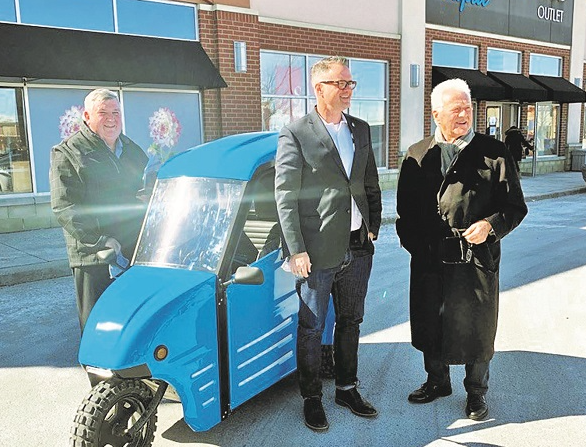Little over a year-and-a-half ago, Ontario Premier Doug Ford approached Magna founder Frank Stronach with a dilemma.
General Motors had recently begun to wrap up a great deal of its operations in Ontario and, given Stronach’s track record in the automotive industry, the premier sought advice on how to generate jobs in a very specific sector.
It was a simple question, but it needed an extraordinary response and Stronach moved projects onto the backburner to focus on the task at hand.
He considered the problem one day while making the commute to Toronto.
“I had to go downtown a few times but what normally took me about half-an-hour to get down to Bay Street took an hour if everything was fine, two hours if there was a traffic jam,” he says. “About 95 per cent of the cars I saw had only one person in there: the driver. I was in the traffic jam and thought, ‘Holy smoke, I feel sorry for the people who have to do this every day.’”
And then the penny dropped.
“When the premier called me, I went back to the workbench and started to do a few sketches and started to make a prototype – just as I have done for the last 50 or 60 years,” says Mr. Stronach.
The solution, he said, was to focus on electric vehicles here at home – but not the standard electric or hybrid sedans, but a compact electric vehicle that can get a single occupant where they need to go around town and connect with transit hubs.
This was the driving principle behind the development of the ELVY Sarit (Safe Affordable Reliable Innovative Transportation).
The Sarit is billed as “the future of urban automotive transportation” and production will begin over the next year at a Stronach-owned plant on Aurora Road in Whitchurch-Stouffville – the first in a future complement of 20 plants in the United States and five in Canada.
Built around an engineered safety cage, the three-wheeled vehicle will be able to travel 80 miles on a single overnight charge from a standard wall outlet.
It is designed to go anywhere a bike can go and could save drivers nearly $11,400 a year in costs related to fuel, parking, insurance and maintenance.
“We use a lot of non-renewable resources with gas and oil and I thought if we add up all the gasoline being used every day from Tokyo to Rio, from Beijing to London, Rome, Los Angeles and New York, it is like the Hudson River flowing,” says Stronach. “Just imagine a giant river that is being used daily. You don’t have to be a scientist to know that the fuel will run out sooner rather than later.”
The vehicle’s primary purpose, says Stronach, is to go from your home to your workplace or a grocery store and back home again. In communities like Aurora, it is ideal to travel to and from GO stations and other transit hubs where parking is often at a premium.
“The first thing is safety,” says Stronach, noting that he is working with Ontario’s Ministry of Transportation on a micro-mobility handbook outlining the changing rules of the road. “The fact is, micro-mobility will be a must. Our cities are choked up in traffic and greenhouse gases. Look, if you live around the 401 and go into the city, why do you have to have a big car?”
Stronach’s property on the southeast corner of Aurora Road and Highway 404 will be the headquarters for Stronach International and the nerve-centre for Sarit development.
He says he chose the location as it is a “gateway to York Region,” a place where he has left an indelible mark as an employer and community-builder.
“I just want to have less traffic here and this is where we will be doing more research. From there, we can copy the model and have the perfect factories. I think there will be about 20 in the United States and five in Canada. I don’t want to rely on China; I want to have the product made in Canada and the U.S. I have done well here because I interface with employees. The employees did well because I shared with them and it was a give and take. If the economy doesn’t work, nothing else will. We can’t feed the hungry and we can’t look after the most fragile in our society without it.”
Brock Weir is a federally funded Local Journalism Initiative reporter at The Auroran
